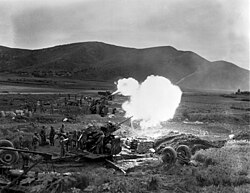Qyredine-Tangkuoan War
This article is incomplete because it is pending further input from participants, or it is a work-in-progress by one author. Please comment on this article's talk page to share your input, comments and questions. Note: To contribute to this article, you may need to seek help from the author(s) of this page. |
| Qyredine-Tangkuoan War | |||||||
|---|---|---|---|---|---|---|---|
| Part of Aeian Cold War | |||||||
 Qyredine artillery at the Battle of XX | |||||||
| |||||||
| Belligerents | |||||||
|
| Tangkuo People's Republic | ||||||
| Commanders and leaders | |||||||
|
| some dude | ||||||
| Strength | |||||||
| 1,400,000 | |||||||
| Casualties and losses | |||||||
| ??? | |||||||
The Qyredine-Tangkuoan War (Yen: 桀唐戰爭, Qyredine: Chie Dan chantson) was a conflict in East Catai between Qyred and Tangkuo. Beginning in 1961 after Qyred's invasion of communist Tangkuo, it ended in 1966 with the Treaty of Danlok that concluded the rather indecisive conflict.
Despite being the smallest of the post-Yen states in East Catai population-wise, Qyred in the first half of the 20th century had became a significant regional power. However its strength economically and politically had began to falter in the 1950s with a series of financial troubles and the ascension of close neighbours such as ?? to powerful positions, while following a communist revolution in Tangkuo the government was eager to spread its influence ideologically. The emergence of this threat from the north alerted the ruling establishment in Qyred, who were also eager to use conflict to transfer national attention from internal issues. In 1959, the Shiebin Emperor condemned Tangkuoan communism in a renowned and public speech, sparking further tensions; in 1961, Qyred, after condemning again Tangkuoan attempts at exporting revolution, issued an ultimatum for the communists to step down or face consequences. An invasion of Tangkuo expectedly followed.
<course of the war>
While indecisive, the war proved to be devastating to both sides. The failure of Qyred to achieve its goals in the war marked its total recession from hegemon status, and economic issues that were worsened by the war caused no small amount of unrest. The Truth-Cleansing Sect would be among the forces that emerged from the post-war chaos in Qyred. The destruction of the war also impaired the economy of communist Tangkuo, causing general stagnation and also seeding discontent as the regime limped on until its collapse in 1989.